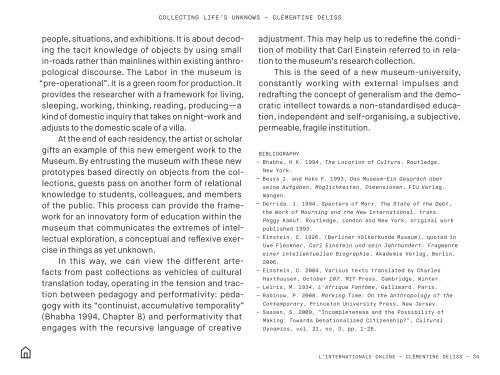DECOLONISING MUSEUMS
decolonisingmuseums_pdf-final
decolonisingmuseums_pdf-final
You also want an ePaper? Increase the reach of your titles
YUMPU automatically turns print PDFs into web optimized ePapers that Google loves.
COLLECTING LIFE’S UNKNOWS – CLÉMENTINE DELISS<br />
people, situations, and exhibitions. It is about decoding<br />
the tacit knowledge of objects by using small<br />
in-roads rather than mainlines within existing anthropological<br />
discourse. The Labor in the museum is<br />
“pre-operational”. It is a green room for production. It<br />
provides the researcher with a framework for living,<br />
sleeping, working, thinking, reading, producing—a<br />
kind of domestic inquiry that takes on night-work and<br />
adjusts to the domestic scale of a villa.<br />
At the end of each residency, the artist or scholar<br />
gifts an example of this new emergent work to the<br />
Museum. By entrusting the museum with these new<br />
prototypes based directly on objects from the collections,<br />
guests pass on another form of relational<br />
knowledge to students, colleagues, and members<br />
of the public. This process can provide the framework<br />
for an innovatory form of education within the<br />
museum that communicates the extremes of intellectual<br />
exploration, a conceptual and reflexive exercise<br />
in things as yet unknown.<br />
In this way, we can view the different artefacts<br />
from past collections as vehicles of cultural<br />
translation today, operating in the tension and traction<br />
between pedagogy and performativity: pedagogy<br />
with its “continuist, accumulative temporality”<br />
(Bhabha 1994, Chapter 8) and performativity that<br />
engages with the recursive language of creative<br />
adjustment. This may help us to redefine the condition<br />
of mobility that Carl Einstein referred to in relation<br />
to the museum’s research collection.<br />
This is the seed of a new museum-university,<br />
constantly working with external impulses and<br />
redrafting the concept of generalism and the democratic<br />
intellect towards a non-standardised education,<br />
independent and self-organising, a subjective,<br />
permeable, fragile institution.<br />
BIBLIOGRAPHY<br />
— Bhabha, H.K. 1994, The Location of Culture, Routledge,<br />
New York.<br />
— Beuys J. and Haks F. 1993, Das Museum—Ein Gespräch über<br />
seine Aufgaben, Möglichkeiten, Dimensionen, FIU Verlag,<br />
Wangen.<br />
— Derrida, J. 1994, Specters of Marx: The State of the Debt,<br />
the Work of Mourning and the New International, trans.<br />
Peggy Kamuf, Routledge, London and New York, original work<br />
published 1993.<br />
— Einstein, C. 1926, (Berliner Völkerkunde Museum), quoted in<br />
Uwe Fleckner, Carl Einstein und sein Jahrhundert. Fragmente<br />
einer intellektuellen Biographie, Akademie Verlag, Berlin,<br />
2006.<br />
— Einstein, C. 2004, Various texts translated by Charles<br />
Haxthausen, October 107, MIT Press, Cambridge, Winter.<br />
— Leiris, M. 1934, L’Afrique Fantôme, Gallimard, Paris.<br />
— Rabinow, P. 2008, Marking Time: On the Anthropology of the<br />
Contemporary, Princeton University Press, New Jersey.<br />
— Sassen, S. 2009, “Incompleteness and the Possibility of<br />
Making: Towards Denationalized Citizenship?”, Cultural<br />
Dynamics, vol. 21, no. 3, pp. 1-28.<br />
L’INTERNATIONALE ONLINE – CLÉMENTINE DELISS – 34


